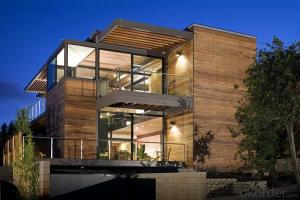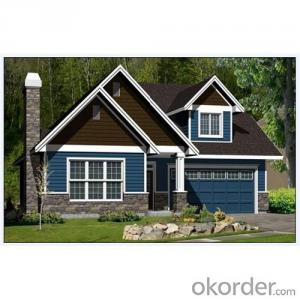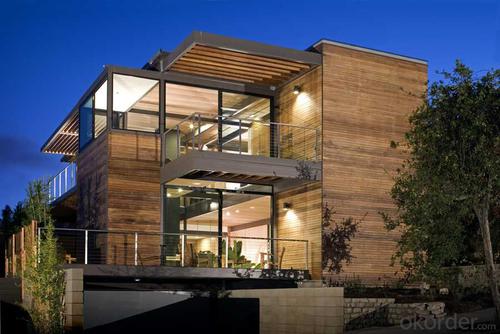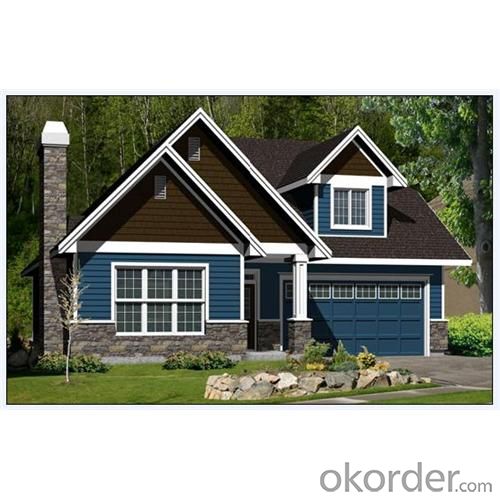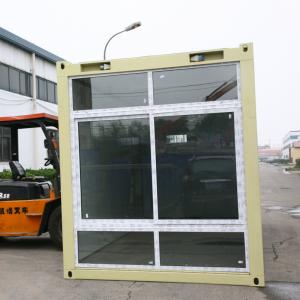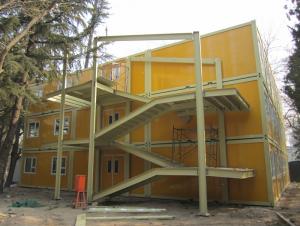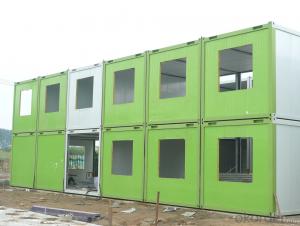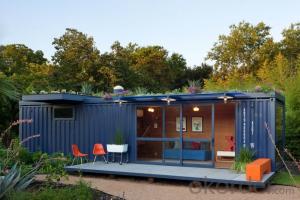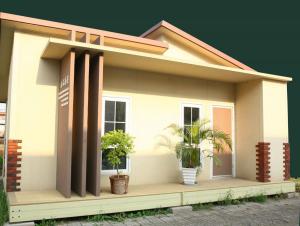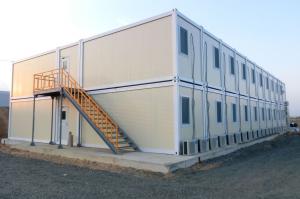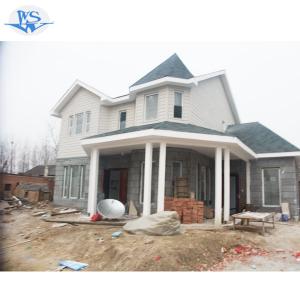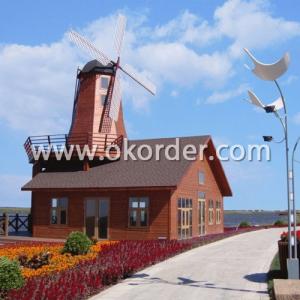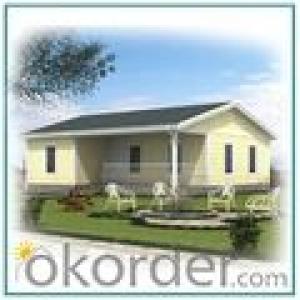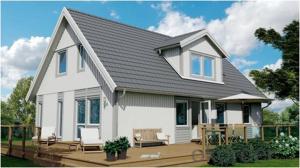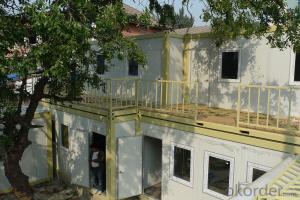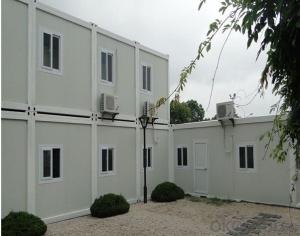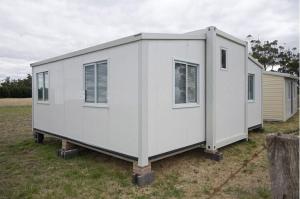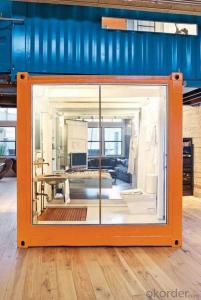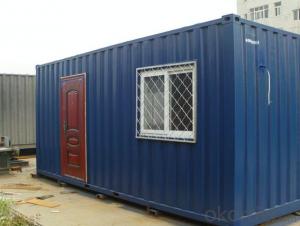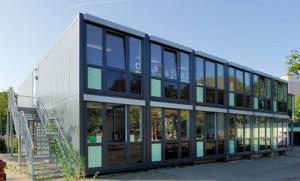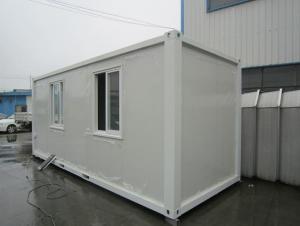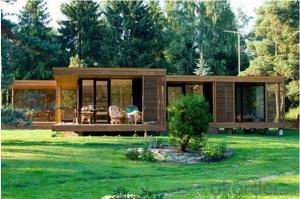Prefab Container Cabin with Modern Design
- Loading Port:
- Shanghai
- Payment Terms:
- TT OR LC
- Min Order Qty:
- 1 m²
- Supply Capability:
- 10000 m²/month
OKorder Service Pledge
OKorder Financial Service
You Might Also Like
Affordable Prefab House;light steel structure prefab houses
light steel structure prefab house Space
Container house is real boring like a box. Although we did lot of work on it with insulation, interior and exterior decoration, it seems still a box. And with the decorative layers, the original small space inside to be more narrow (2.13m to be 2.0m), how could we turn around in our living room with sofa and TV…
From now on, breaking the constraint of the size, enjoy the big space and high quality life in our cabin. (3.0m * 5.8m rooms).
Assembly
You are not superman, the first and big problem you worried about is how to assembly? You buy a prefab house with tanglesome package, scattered parts on the ground... I cannot imagine your agony.
It is more easier and faster with Steelvilla cabin, only 10 steps like the IKEA furniture. No heavy work, no special tools, no technician, and no crane required.
Delivery
If the 20 feet or 40 feet container house, cannot be packaged. Hard to deliver.
Steelvilla cabin is with flat package, easy to load and unload. Fast-Assembly technology makes things are much easier.
Appearance
Container house is container that is truth. No one can change.
SteelVilla cabin is with high standard design, it looks modern and it is practicable.
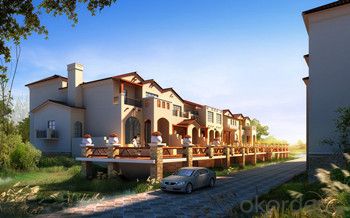
- Q: Can container houses be designed with a pet-friendly space?
- Yes, container houses can definitely be designed with a pet-friendly space. One of the advantages of container houses is their flexibility and adaptability in terms of design. With proper planning and consideration, it is absolutely possible to create a pet-friendly environment within a container house. To make a container house pet-friendly, several factors should be taken into account. Firstly, the layout and interior design of the house should be tailored to accommodate the needs of pets. This may include incorporating designated areas for pets such as a sleeping or resting space, play area, and feeding station. It's also important to consider the size and breed of the pet to ensure sufficient space and comfort. Additionally, the materials and finishes used in the construction of the container house should be pet-friendly. For example, using durable and easy-to-clean flooring options such as laminate or vinyl can be ideal for pets, as accidents or messes can be easily wiped away. Similarly, choosing furniture and upholstery that is resistant to scratches or stains can help maintain a pet-friendly environment. Furthermore, proper ventilation and natural lighting should be prioritized to ensure a healthy and comfortable living space for both the pet and the owner. Incorporating windows or skylights can provide ample natural light and fresh air, which are essential for pets' well-being. Lastly, outdoor spaces such as a balcony, deck, or even a small garden can be incorporated into the design to allow pets to enjoy the outdoors safely. Installing a secure fence or barrier around these spaces will ensure that pets are protected and cannot escape. In summary, container houses can be designed with a pet-friendly space by considering the layout, materials, ventilation, and outdoor areas. By taking these factors into account, it is possible to create a comfortable and safe living environment for both humans and their furry companions.
- Q: Are container houses suitable for areas with strict energy efficiency requirements?
- Container houses are a great option for areas with strict energy efficiency requirements. They can be designed and built to meet stringent standards by incorporating various sustainable features. To begin with, container houses can have excellent insulation to minimize heat transfer and reduce the need for excessive heating or cooling. By using high-quality insulation materials like spray foam, cellulose insulation, or rigid foam boards, the containers can be effectively sealed to prevent air leakage. Moreover, container houses can have energy-efficient windows and doors with low U-values and high thermal resistance. This helps to minimize heat gain or loss through the openings, contributing to overall energy efficiency. Furthermore, container houses can incorporate renewable energy systems such as solar panels or wind turbines to generate clean and sustainable energy. This not only powers the house but also reduces reliance on traditional energy sources, further enhancing energy efficiency. Additionally, container houses can be designed to maximize natural lighting and ventilation. By strategically placing windows, skylights, and ventilation openings, they can allow for ample daylight and fresh air, reducing the need for artificial lighting and mechanical ventilation systems. Lastly, container houses can utilize energy-efficient appliances and fixtures, such as LED lights, energy-saving appliances, and low-flow plumbing fixtures. These features help to reduce energy consumption and contribute to a more sustainable and energy-efficient living environment. In conclusion, container houses are suitable for areas with strict energy efficiency requirements. Through proper insulation, energy-efficient windows, renewable energy systems, natural lighting, and efficient appliances, container houses can meet and even exceed the energy efficiency standards set by strict regulations.
- Q: Can container houses be designed with a home office space?
- Yes, container houses can definitely be designed with a home office space. One of the key advantages of container houses is their versatility and ability to be customized according to individual needs and preferences. With the right design and layout, a container house can provide a functional and comfortable space for a home office. Container houses can be modified to include dedicated office areas by dividing the available space into different sections. This can be achieved by using partitions, walls, or even adding an extra container to create the desired office space. The layout can also be optimized to ensure proper lighting, ventilation, and insulation, creating a conducive working environment. Additionally, container houses can be designed with various features to enhance the functionality of the home office. These may include built-in shelves, storage units, or desk spaces to accommodate office equipment and supplies. Electrical and networking systems can also be installed to ensure connectivity and facilitate the use of electronic devices. Furthermore, container houses offer the advantage of being easily expandable. If the need for a larger home office arises, additional containers can be added or the existing structure can be modified to accommodate the desired space. In conclusion, container houses can be designed to include a home office space. With proper planning, customization, and utilization of the available space, container houses offer a practical and flexible option for those who require a dedicated office area within their home.
- Q: Can container houses be designed for outdoor recreational areas?
- Yes, container houses can be designed and built for outdoor recreational areas. Container houses offer versatility in design and can be customized to fit specific purposes, including outdoor recreational areas. They can be modified with various features such as outdoor decks, swimming pools, or even integrated into larger recreational complexes. Container houses are durable and weather-resistant, making them suitable for outdoor environments.
- Q: Are container houses suitable for urban living?
- Yes, container houses can be suitable for urban living. They offer a cost-effective and sustainable solution to housing shortages in urban areas. Container houses are compact, customizable, and can be easily stacked or arranged to maximize space in crowded cities. Additionally, their modular nature allows for quick construction and flexibility in design. However, factors such as local regulations, infrastructure, and aesthetics should be considered to ensure their suitability in specific urban contexts.
- Q: How do container houses compare to traditional houses in terms of resale value?
- Container houses typically have a lower resale value in comparison to traditional houses, primarily because they differ from traditional homes in a few aspects. Firstly, container houses are often viewed as unconventional and less mainstream, which can limit their appeal to a broader range of potential buyers. Moreover, container houses generally have limited square footage and may lack certain amenities and features commonly found in traditional homes. Additionally, the construction materials used in container houses, such as steel and corrugated metal, may not possess the same level of aesthetic appeal or durability as the materials employed in traditional houses. This can negatively affect the overall perceived value of the property. Nevertheless, it is worth noting that the resale value of a container house can also be influenced by various factors like its location, design, and customization. If the container house is situated in a desirable location, designed with meticulous attention to detail, and incorporates high-quality finishes, it may attract a niche market of buyers who appreciate the unique charm of container living, potentially increasing its resale value. Ultimately, although container houses generally do not possess the same resale value as traditional houses, there are circumstances in which they can retain their value or even appreciate.
- Q: Can container houses be designed with earthquake-resistant features?
- Container houses have the potential to incorporate earthquake-resistant features within their design. Although shipping containers themselves may not possess natural resistance to earthquakes, they can be altered and reinforced to withstand seismic activities. To achieve earthquake resistance in container houses, various measures can be taken. Firstly, the foundation of the house should be meticulously engineered to absorb and distribute seismic forces. This could involve employing a combination of concrete footings, steel reinforcements, and secure anchoring to the ground. Secondly, the containers can be interconnected and welded together to create a sturdier structure. This aids in evenly distributing seismic forces throughout the entire house, rather than concentrating them in one specific area. Strengthening the corners and walls of the containers with additional steel beams can also augment their structural integrity. Furthermore, insulation materials such as foam or spray foam can be utilized to fortify the walls and increase their resistance to shaking. These materials not only provide insulation but also enhance the overall rigidity of the container house. Besides structural modifications, implementing safety measures like installing earthquake-resistant glass, securing heavy furniture, and utilizing flexible plumbing and electrical connections can further enhance the earthquake resistance of container houses. It is important to recognize that while these measures can significantly improve the earthquake resistance of container houses, they may not guarantee complete protection during extreme seismic events. Therefore, it is crucial to seek guidance from experienced architects, engineers, and contractors who specialize in designing earthquake-resistant structures. This will ensure the safety and durability of container houses in regions prone to earthquakes.
- Q: Are container houses suitable for small business owners?
- Yes, container houses can be suitable for small business owners for several reasons. Firstly, container houses are cost-effective compared to traditional brick and mortar structures. Small business owners often have limited budgets, and container houses provide an affordable option for setting up a business location. Secondly, container houses are highly versatile and customizable. They can be modified and tailored to meet the specific needs of different types of businesses. Whether it is a retail store, office space, or a small café, container houses can be adapted to create a functional and attractive workspace. Additionally, container houses are portable and can be easily relocated. This feature is particularly beneficial for small business owners who may need to change their location or expand their business in the future. Container houses can be easily transported to a new site, saving time and money on construction costs. Moreover, container houses are eco-friendly and sustainable. They are often made from recycled materials, reducing the environmental impact associated with traditional construction methods. Small business owners can align their business with sustainable practices by choosing a container house as their workspace. Overall, container houses provide a practical and affordable solution for small business owners. They offer versatility, cost-effectiveness, portability, and eco-friendliness, making them a suitable option for entrepreneurs with limited resources but big ambitions.
- Q: Are container houses suitable for urban environments?
- Indeed, urban environments can indeed be suitable for container houses. These unique dwellings are constructed from repurposed shipping containers, which are specifically designed to be durable, weather-resistant, and stackable. These characteristics make them a perfect fit for urban settings where space is limited and construction costs can be exorbitant. Container houses possess a remarkable level of adaptability, allowing them to seamlessly integrate into various urban landscapes, including vacant lots or rooftops. Their modular nature enables easy customization and expansion, making them incredibly versatile and capable of meeting diverse needs and preferences. Moreover, container houses can be constructed swiftly and at a lower expense compared to traditional housing, rendering them an appealing choice for urban environments grappling with a shortage of affordable accommodation. Not only do container houses boast practical advantages, but they also offer significant environmental benefits. By repurposing shipping containers, we are actively reducing waste and granting these structures a second lease on life. Furthermore, container houses can be designed to be energy-efficient, incorporating features like insulation, solar panels, and rainwater harvesting systems. This renders them a sustainable alternative for urban environments striving to minimize their carbon footprint and promote eco-friendly living. In addition, container houses can play a pivotal role in the revitalization of urban areas. By utilizing vacant lots or repurposing existing structures, container houses have the power to transform underutilized spaces into vibrant and thriving communities. Furthermore, they can serve as temporary housing solutions during times of natural disasters or housing shortages, providing immediate relief and support to affected populations. However, it is essential to consider certain limitations associated with container houses in urban environments. Building codes and regulations may vary, and obtaining permits for container houses can sometimes prove to be a challenging endeavor. Additionally, the compact nature of urban living may give rise to concerns regarding noise and privacy. All in all, container houses possess the potential to be an innovative and fitting solution for urban environments. They offer affordability, sustainability, and adaptability, making them a viable housing option for urban residents seeking an alternative to traditional housing.
- Q: Can container houses be easily modified or remodeled?
- Container houses offer great flexibility and convenience when it comes to modification or remodeling. The use of shipping containers as building materials provides several advantages in terms of versatility and ease of modification. These containers are specifically designed to be stackable and transportable, which makes rearranging or modifying them according to the owner's requirements a simple task. By consulting professionals, container houses can be easily customized to include additional rooms, windows, doors, or even multiple containers can be combined to create a larger living area. Moreover, container houses can also be remodeled to incorporate insulation, plumbing, and electrical systems, ensuring comfortable and functional long-term living. The modular nature of container houses offers limitless possibilities in terms of design and layout, making them an adaptable and customizable choice for homeowners.
Send your message to us
Prefab Container Cabin with Modern Design
- Loading Port:
- Shanghai
- Payment Terms:
- TT OR LC
- Min Order Qty:
- 1 m²
- Supply Capability:
- 10000 m²/month
OKorder Service Pledge
OKorder Financial Service
Similar products
Hot products
Hot Searches
Related keywords
